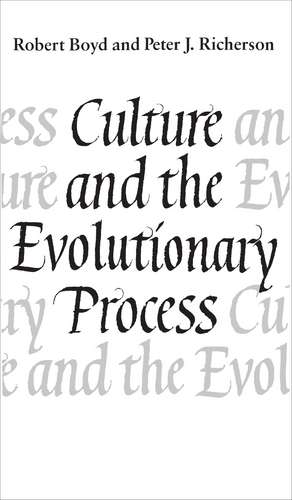Culture and the Evolutionary Process
Autor Robert Boyd, Peter J. Richersonen Limba Engleză Paperback – 31 mai 1988
How do biological, psychological, sociological, and cultural factors combine to change societies over the long run? Boyd and Richerson explore how genetic and cultural factors interact, under the influence of evolutionary forces, to produce the diversity we see in human cultures. Using methods developed by population biologists, they propose a theory of cultural evolution that is an original and fair-minded alternative to the sociobiology debate.
Preț: 352.99 lei
Nou
Puncte Express: 529
Preț estimativ în valută:
67.55€ • 69.79$ • 56.22£
67.55€ • 69.79$ • 56.22£
Carte tipărită la comandă
Livrare economică 25 martie-08 aprilie
Preluare comenzi: 021 569.72.76
Specificații
ISBN-13: 9780226069333
ISBN-10: 0226069338
Pagini: 340
Dimensiuni: 168 x 241 x 23 mm
Greutate: 0.54 kg
Ediția:1
Editura: University of Chicago Press
Colecția University of Chicago Press
ISBN-10: 0226069338
Pagini: 340
Dimensiuni: 168 x 241 x 23 mm
Greutate: 0.54 kg
Ediția:1
Editura: University of Chicago Press
Colecția University of Chicago Press
Cuprins
Preface
1. Overview
An Informal Sketch of the Dual Inheritance Model
The Relationship between Genetic and Cultural Evolution
The General Utility of Dual Inheritance Theory
Conclusion
2. Some Methodological Preliminaries
Darwinian Approach
Modeling Complex Phenomena
Use of Data
In Defense of Mathematical Models
In Defense of Analogies
Conclusion
3. The Cultural Inheritance System
Defining Cultural Inheritance
Review of Data from the Social Sciences
Models of Cultural Transmission
Conclusion
4. Guided Variation and the Evolution of Cultural Inheritance
Models of Learning
The Force of Guided Variation
The Evolution of Cultural Transmission
Comparing Genetic and Cultural Transmission
Conclusion
5. Biased Transmission and the Sociobiology Debate
An Overview of Biased Transmission
Models of Direct Bias
The Adaptive Consequences of Direct Bias
An Evaluation of Sociobiological Hypotheses
The Empirical Evidence
Conclusion
6. The Natural Selection of Cultural Variations: Conflicts between Cultural and Genetic Evolution
Empirical Examples
Models of Natural Selection
The Evolution of Nonparental Transmission
The Interaction of Selection with Direct Bias and Guided Variation
The Demographic Transition
Conclusion
7. Frequency-dependent Bias and the Evolution of Cooperation
Models of Frequency-dependent Bias
The Adaptive Advantages of Conformist Transmission
Empirical Research on Conformity
Conformit Transmission and Cultural Group Selection
Conclusion
8. Indirect Bias and the Evolution of Symbolic Traits
Evidence for Indirect Bias
Models of Indirect Bias
The Runaway Process
Possible Examples of the Runaway Process
Symbolic Culture and the Runaway and Drift-Away Processes
Conclusion
9. Conclusion
Summary of the Main Results
Utility of Dual Inheritance Theory
Future Work
Conclusion
References and Author Index
Subject Index
1. Overview
An Informal Sketch of the Dual Inheritance Model
The Relationship between Genetic and Cultural Evolution
The General Utility of Dual Inheritance Theory
Conclusion
2. Some Methodological Preliminaries
Darwinian Approach
Modeling Complex Phenomena
Use of Data
In Defense of Mathematical Models
In Defense of Analogies
Conclusion
3. The Cultural Inheritance System
Defining Cultural Inheritance
Review of Data from the Social Sciences
Models of Cultural Transmission
Conclusion
4. Guided Variation and the Evolution of Cultural Inheritance
Models of Learning
The Force of Guided Variation
The Evolution of Cultural Transmission
Comparing Genetic and Cultural Transmission
Conclusion
5. Biased Transmission and the Sociobiology Debate
An Overview of Biased Transmission
Models of Direct Bias
The Adaptive Consequences of Direct Bias
An Evaluation of Sociobiological Hypotheses
The Empirical Evidence
Conclusion
6. The Natural Selection of Cultural Variations: Conflicts between Cultural and Genetic Evolution
Empirical Examples
Models of Natural Selection
The Evolution of Nonparental Transmission
The Interaction of Selection with Direct Bias and Guided Variation
The Demographic Transition
Conclusion
7. Frequency-dependent Bias and the Evolution of Cooperation
Models of Frequency-dependent Bias
The Adaptive Advantages of Conformist Transmission
Empirical Research on Conformity
Conformit Transmission and Cultural Group Selection
Conclusion
8. Indirect Bias and the Evolution of Symbolic Traits
Evidence for Indirect Bias
Models of Indirect Bias
The Runaway Process
Possible Examples of the Runaway Process
Symbolic Culture and the Runaway and Drift-Away Processes
Conclusion
9. Conclusion
Summary of the Main Results
Utility of Dual Inheritance Theory
Future Work
Conclusion
References and Author Index
Subject Index
